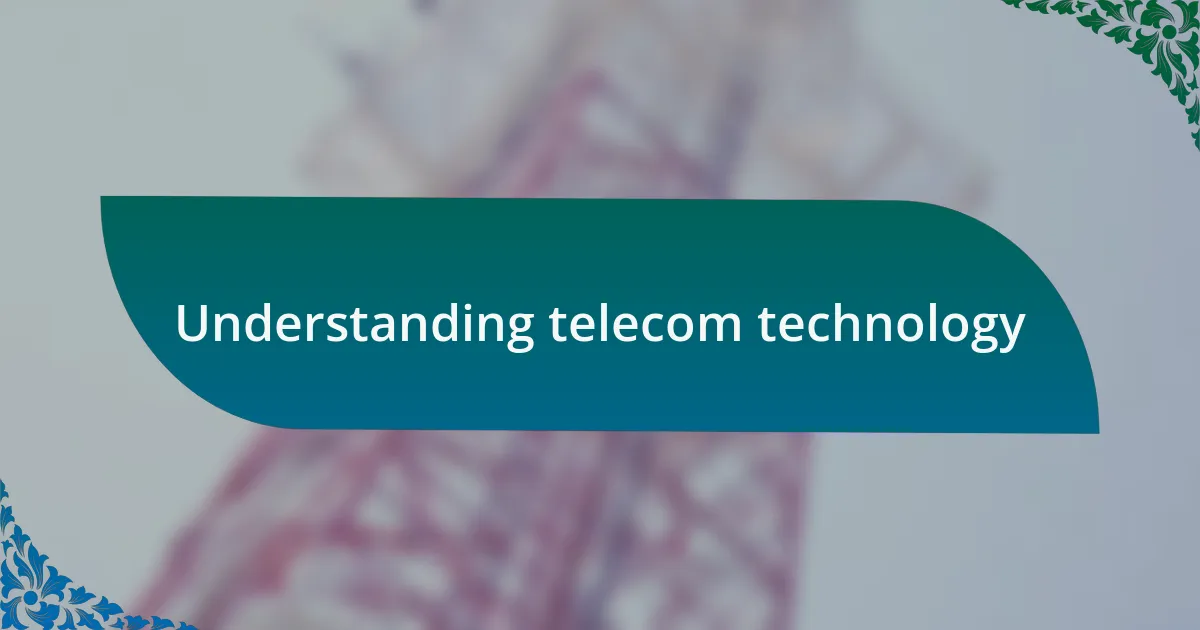Key takeaways:
- Telecom technology is crucial for modern communication, affecting personal relationships and interactions significantly.
- User app reviews provide valuable insights on performance, emotional connections, and privacy concerns, influencing app development trends.
- Negative experiences highlighted in reviews can steer users away from poor apps, while positive stories can inspire downloads and enhance user choices.
- User feedback reveals community needs and emphasizes the importance of usability and emotional impact in app design.

Understanding telecom technology
Telecom technology is the backbone of modern communication, enabling the exchange of information across vast distances almost instantaneously. I remember the excitement I felt when I first experienced high-speed internet; it changed the way I interacted with the world. Have you ever wondered how a simple text message can travel across the globe in milliseconds? It’s fascinating to realize that behind every call or message, there’s a complex system of cables, satellites, and towers working seamlessly together.
As I delved deeper into understanding this technology, I stumbled upon the significance of network infrastructure. The way signals are transmitted—be it through fiber optics or radio waves—affects everything from call clarity to internet speed. I recall an instance when poor connectivity frustrated my work; it made me appreciate the nuanced challenges that telecom professionals face daily. Isn’t it remarkable how a single point of failure can impact an entire network?
Moreover, I’ve learned that telecommunications is not just about technology—it’s about people. Our connectivity shapes relationships, and every advancement has the potential to enhance our interactions. Picture this: a family using video calls to stay close despite being continents apart. How does that reflect on our social fabric? The evolution of telecom technology has created pathways for connection that were once unimaginable, profoundly influencing our lives and how we relate to one another.

Importance of app reviews
When it comes to app reviews, their importance can’t be overstated. They provide real-user insights that often shine a light on the actual performance of an app. I still remember downloading a widely recommended telecom app, only to be disappointed by its frequent crashes. Had I read the reviews beforehand, I could have avoided that frustration.
These reviews not only highlight performance issues but also reveal user experiences that developers might overlook. For instance, I came across a review that pointed out a hidden feature in a messaging app, which greatly improved my communication experience. It made me wonder: what else am I missing in these apps because I didn’t take the time to listen to other users?
Moreover, app reviews can influence development trends in the telecom sector. When users voice their needs and frustrations, developers are often motivated to innovate and refine their offerings. Just think about how many telecom apps have evolved based on user suggestions. That feedback loop is critical for continuous improvement, making app reviews a vital part of the tech landscape.

Key trends in app reviews
One key trend in app reviews is the growing emphasis on specific functionality. As I browse through reviews, I often notice users not only commenting on general performance but also discussing unique features in detail. For example, after reading about a telecom app’s advanced call-blocking feature, I felt compelled to try it out. It’s fascinating how users can pinpoint what works and what doesn’t, helping others make informed choices.
Another noticeable trend is the shift towards emotional expression in reviews. Many users now share personal stories about how an app impacted their daily lives. I found it striking when one reviewer described how a mobile payment app alleviated their financial stress during a difficult month. This kind of honesty goes beyond a simple star rating; it paints a vivid picture of how technology integrates into our personal experiences. Isn’t it incredible how an app can become a lifeline for some?
Lastly, there’s an increasing awareness of privacy concerns reflected in user feedback. I’ve read numerous reviews where users voice their apprehensions about data security when using telecom apps. It made me reflect on my own app usage—do I fully understand what data I’m sharing? This trend signals to developers that transparency about data practices is essential; if they want to build trust, they need to actively engage with those concerns.

How reviews influence user choice
Reading app reviews has profoundly shaped how I decide which telecom apps to download. I remember hesitating about a specific app until I came across a review from a user who described how the app had completely transformed their connectivity experience during a vacation. That emotional connection sparked my curiosity, pushing me to try it for myself. How can one story sway my download decision so strongly? It’s simply the power of shared experiences that resonates with users like me.
Moreover, it’s fascinating how negative reviews can create a sense of urgency. I recall coming across a few reviews highlighting ongoing issues with a customer service feature in an app I was considering. Those candid comments made me pause and think—would I really want to gamble my time and energy on an app that might let me down? This kind of insight is invaluable; it emphasizes how user feedback can steer choices away from potential disappointments.
Lastly, I often notice users discussing updates in reviews, particularly their reactions to fixes and improvements. When I saw one reviewer express relief after a developer rolled out a long-awaited update that addressed major bugs, it made me realize how committed companies are to enhancing user satisfaction. Isn’t it reassuring to see that dialogue between app creators and users? This dynamic interaction not only influences individual choices but also underscores the importance of user feedback in shaping technology.

My experiences with app reviews
As I navigated various app reviews, I found that they often illustrate real-life scenarios that I can relate to. For example, I once read about someone who used a telecom app to manage their family’s data usage seamlessly. This review struck a chord with me, as I often struggle to keep tabs on our family plan. The mention of practical benefits made me feel like I was not just evaluating an app, but rather considering a solution to a personal challenge.
In my experience, a robust review can feel like a conversation with a friend. I remember a review that passionately detailed how an app saved a user money on their international calls—something I was desperately trying to find a better method for. Was I truly ready to spend money without understanding the potential savings? Once that user shared their story, my apprehension faded. It became clear that these insights lay the groundwork for more informed decisions, as if I were receiving advice from someone who genuinely cared about my needs.
I’ve also seen how the emotional tone in app reviews can significantly impact my perspective. I came across a glowing review describing how an app helped a user connect with their loved ones across the globe during tough times. It brought back memories of my own experiences using telecom services during long-distance relationships. How powerful is it that such an emotional connection, expressed through a review, can amplify my desire to try that app? These connections remind me that behind every review is a real human experience, enriching the decision-making process and adding personal depth to what could otherwise be a simple transaction.

Lessons learned from user feedback
User feedback often reveals patterns that I might not consider on my own. For instance, I once stumbled upon a review where a user lamented about the app’s complex interface. This resonated with me because I remember downloading a telecom app where the user experience felt overwhelming. It prompted me to reflect: is a sleek, easy-to-navigate design more valuable than a multitude of features that I may never use? This feedback made me prioritize usability over functionality in my future app choices.
I’ve also learned that reviews can reflect community needs and desires, which I had not appreciated before. In one instance, I read a review from a user who needed better accessibility options for visually impaired individuals. This reminded me of the times I overlooked how technology could impact various parts of our population. It made me ask myself, when considering an app, am I taking into account how it serves diverse users? Such feedback opens my eyes to the broader implications of telecom advancements.
Additionally, the emotional weight behind user experiences is remarkable. A heartfelt review from someone who found solace during a family crisis because of a reliable app struck a chord with me. It made me reevaluate my expectations from these services. Can an app be more than just a tech tool? Indeed, when I see the meaningful impact an app can have, it shifts my perspective dramatically. I’ve learned that user feedback encapsulates not just product performance, but also the profound ways technology intertwines with our lives.

Applying insights for better apps
When I analyze user feedback, I often find hidden gems that can transform app development. For instance, I once encountered a comment about a telecom app’s sluggish response time during peak hours, which sparked my curiosity. I realized how performance issues can frustrate even the most loyal users and asked myself, what measures can developers take to enhance speed and reliability when it matters most? This insight has led me to prioritize technical efficiency as a key element in my own app recommendations.
Reviewers often express specific preferences that reveal what users genuinely value. I remember reading about a user who cherished an app’s feature that allowed call blocking and customizing ringtones for different contacts. I thought, how simple yet impactful! It’s these small, thoughtful improvements that can elevate an app from being just functional to genuinely beloved. Paying attention to these preferences helps me advocate for apps that prioritize user experience in practical ways.
Furthermore, I’ve come to appreciate how feedback can guide the emotional tone of an app. I remember a review from a user who spoke about how a straightforward interface made managing their telecom bills less intimidating. The relief in their words made me reflect: in a world filled with complex technology, how can we foster a sense of ease? Understanding that an app can provide comfort rather than stress motivates me to champion designs that focus on simplicity and emotional well-being. This perspective deepens my commitment to seeking out applications that resonate positively with users on several levels.